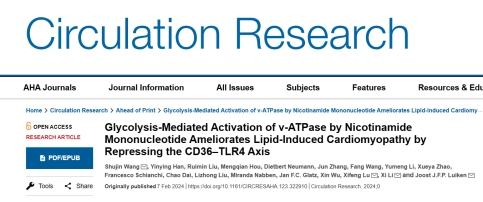On March 1st, 2024, Professor LI Xi and Associate Research Fellow WANG Shujin from CQMU’s Institute of Life Sciences, in collaboration with Shantou University and Maastricht University, published a research paper titled "Glycolysis-Mediated Activation of v-ATPase by Nicotinamide Mononucleotide Ameliorates Lipid-Induced Cardiomyopathy by Repressing the CD36-TLR4 Axis" online in Circulation Research, an authoritative international journal in the cardiovascular field.

Cardiovascular complications, being responsible for 50-80% of deaths in diabetic patients, are a major concern with diabetic cardiomyopathy being a key component. The main causes of diabetic cardiomyopathy arise from the accumulation of excessive lipids in the myocardium and insulin resistance induced by hyperlipidemia. Previous evidence indicate that fatty acids transporter CD36 (scavenger receptor B2), a major membrane protein that increases myocardial lipid uptake, is a crucial target of cardiac lipid metabolism. Recently, this research team has discovered a closely correlation between CD36 translocation and V-ATPase-mediated endosomal acidification, and further indicate that the loss of V-ATPase contributes to the disturbed lipid metabolism through regulating CD36 translocation to cell surface.
On the basis of this, the research team had successfully selected a specific amino acids cocktail, and it protects against lipid-induced cardiac dysfunction through maintaining V-ATPase-mediated lysosomal pH. Additionally, the research team have demonstrated that activating V-ATPase inhibits CD36/TLR translocation to cell surface by stimulating endosomal acidification, and then lowers the contents of diacylglycerol DAG as well as blocking the TLR4-mediated inflammatory signal pathway, eventually ameliorating lipid-induced cardiomyopathy.

This research clearly disclose the roles and underlying mechanisms of V-ATPase in the occurrence and development of diabetic cardiomyopathy, and suggests that targeting V-ATPase is a novel strategy to ameliorate obesity, diabetes, and other related-metabolic diseases.
Link to full article:
https://doi.org/10.1161/CIRCRESAHA.123.322910